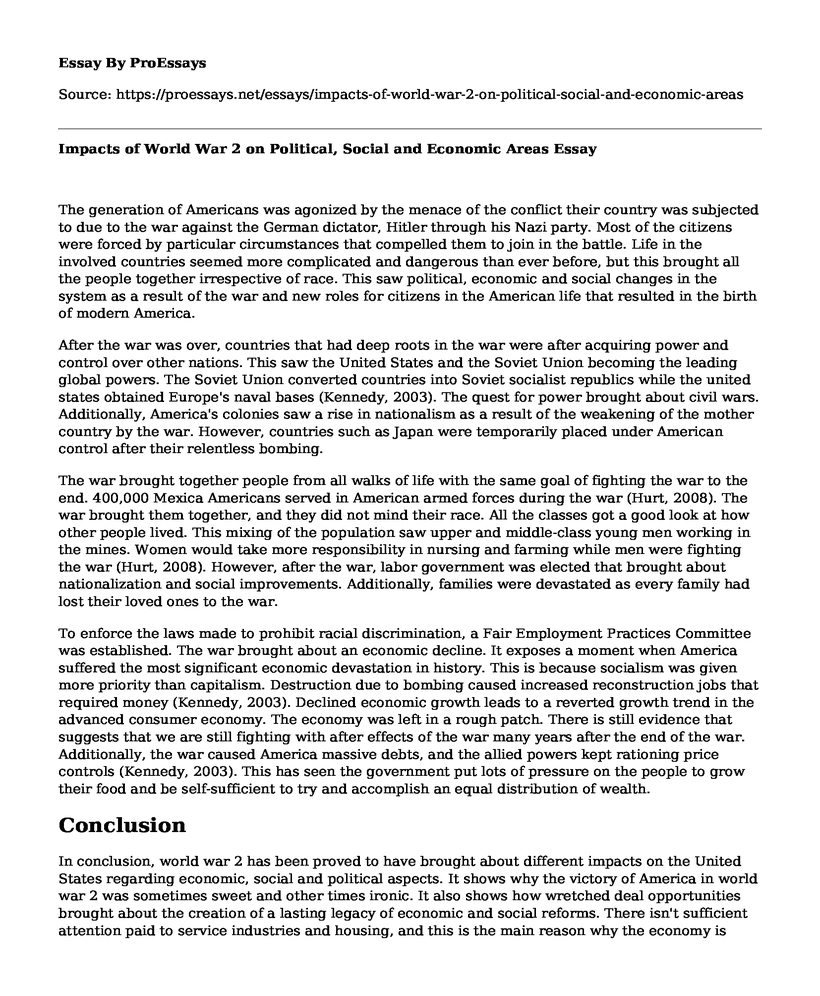The generation of Americans was agonized by the menace of the conflict their country was subjected to due to the war against the German dictator, Hitler through his Nazi party. Most of the citizens were forced by particular circumstances that compelled them to join in the battle. Life in the involved countries seemed more complicated and dangerous than ever before, but this brought all the people together irrespective of race. This saw political, economic and social changes in the system as a result of the war and new roles for citizens in the American life that resulted in the birth of modern America.
After the war was over, countries that had deep roots in the war were after acquiring power and control over other nations. This saw the United States and the Soviet Union becoming the leading global powers. The Soviet Union converted countries into Soviet socialist republics while the united states obtained Europe's naval bases (Kennedy, 2003). The quest for power brought about civil wars. Additionally, America's colonies saw a rise in nationalism as a result of the weakening of the mother country by the war. However, countries such as Japan were temporarily placed under American control after their relentless bombing.
The war brought together people from all walks of life with the same goal of fighting the war to the end. 400,000 Mexica Americans served in American armed forces during the war (Hurt, 2008). The war brought them together, and they did not mind their race. All the classes got a good look at how other people lived. This mixing of the population saw upper and middle-class young men working in the mines. Women would take more responsibility in nursing and farming while men were fighting the war (Hurt, 2008). However, after the war, labor government was elected that brought about nationalization and social improvements. Additionally, families were devastated as every family had lost their loved ones to the war.
To enforce the laws made to prohibit racial discrimination, a Fair Employment Practices Committee was established. The war brought about an economic decline. It exposes a moment when America suffered the most significant economic devastation in history. This is because socialism was given more priority than capitalism. Destruction due to bombing caused increased reconstruction jobs that required money (Kennedy, 2003). Declined economic growth leads to a reverted growth trend in the advanced consumer economy. The economy was left in a rough patch. There is still evidence that suggests that we are still fighting with after effects of the war many years after the end of the war. Additionally, the war caused America massive debts, and the allied powers kept rationing price controls (Kennedy, 2003). This has seen the government put lots of pressure on the people to grow their food and be self-sufficient to try and accomplish an equal distribution of wealth.
Conclusion
In conclusion, world war 2 has been proved to have brought about different impacts on the United States regarding economic, social and political aspects. It shows why the victory of America in world war 2 was sometimes sweet and other times ironic. It also shows how wretched deal opportunities brought about the creation of a lasting legacy of economic and social reforms. There isn't sufficient attention paid to service industries and housing, and this is the main reason why the economy is severely unbalanced.
References
Hurt, R. D. (2008). The Great Plains during World War II. Lincoln: University of Nebraska Press.
Kennedy, D. M. (2003). The American people in World War II: Freedom from fear, part two. Oxford, U.K.: Oxford University Press.
Cite this page
Impacts of World War 2 on Political, Social and Economic Areas. (2022, May 06). Retrieved from https://proessays.net/essays/impacts-of-world-war-2-on-political-social-and-economic-areas
If you are the original author of this essay and no longer wish to have it published on the ProEssays website, please click below to request its removal:
- Relevance of Ghosts of Abu Ghraib with Respect to the Military Police and Interrogators Who Participated
- John Adams and Thomas Jefferson Essay
- Russian Threats and Western Actions Essay
- Julius Caesar's True Story as a Tragic Hero Essay
- The Period of Islamic Spain and Renaissance Essay Example
- US Superpower: Global Influence & Control - Essay Sample
- Essay Example on New Deal: FDR's Plan to Boost the U.S. Economy







